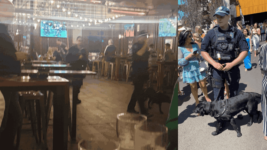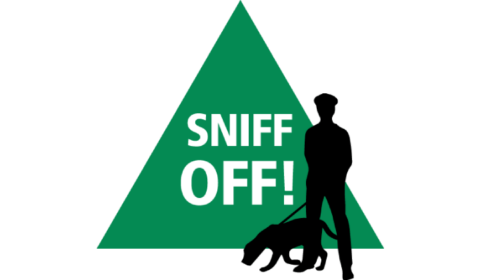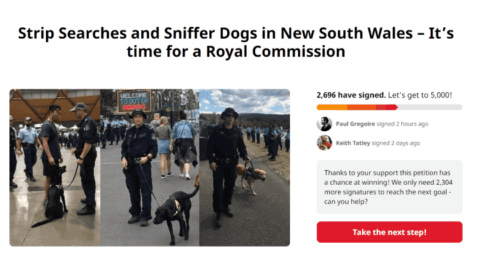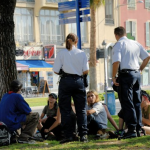Calls for Inquiry Into Illegal Use of Strip Searches and Efficacy of Drug Dog Operations

A sizable number of Sydneysiders know the experience all too well: it’s early Friday evening, you’ve left work for the week and made your way down to the local, and as you’re sinking a few with some friends, some jokers dressed in blue uniforms, carrying guns run a dog through the pub.
Back in the 90s, this didn’t happen. There were no drug dogs. Uniformed police officers didn’t subtly and indiscriminately search you without a warrant for a fifty of pot you may have or may not have scored the night prior.
NSW wasn’t quite the police state that it is these days.
A decade ago, if you went to a festival, the dogs were there, but the cops weren’t hauling off teens that canines indicate may have drugs on them. But now, two armed officers can take a youth into a private area and make them strip down: civilians who do this are charged with sexual assault.
The drugs these pooches are supposedly trying to stop the supply of are still present and still work just as well. Indeed, reports indicate that drugs become more harmful due to interventions like the dogs. And looking down teenage panties hasn’t slowed down the trade in illicit substances either.
Right now, there’s an online petition doing the rounds calling on the leaders of both major NSW parties to initiate a royal commission into the NSW Police Force’s use of strip searches and sniffer dogs.
Get sniffed
“It says a lot, that a member of the public is so fed up with the use of drug dogs in NSW that they go out of their way to create a petition like this,” said a Sniff Off spokesperson, “and the feedback across our social media channels absolutely reflects this frustration.”
“Drug dogs have been in use in NSW since the 2000 Sydney Olympics, and the main impact they’ve had hasn’t been to reduce drug use but to increase police funding and traumatise people just trying to have a good night out,” they continued.
Launched in 2011 by then NSW MLC and now Australian Greens Senator David Shoebridge and the NSW Young Greens, Sniff Off has been campaigning to put an end to the warrantless use of drug dogs in public ever since, and it also raised the issue of increasing strip search use mid-last decade.
Indeed, the Sniff Off Facebook page has been a key site where information about NSW police drug dog and strip search use has and is being shared, and it also provides tipoffs regarding where followers have spotted a sniffer dog operation in progress.
“Sniffer dogs are used by officers to justify strip searches at festivals, bars, train stations and other public places,” Sniff Off told Sydney Criminal Lawyers. “But an indication from a dog alone has never been meant to be sufficient grounds for a search.”
“A little bit of fear”
The NSW man petitioning premier Dominic Perrottet and soon-to-be premier Chris Minns to launch a royal commission into what’s happening in this state points out that a method to target drug supply is now being used on the general public, regardless of whether people are holding any drugs.
The petition cites the 2006 Ombudsman report into the dogs that found searches only turn up drugs a third of the time, which mainly consists of small amounts of cannabis. And it also outlines that the shift towards strip searches has seen the lines of what’s permissible become increasingly blurred.
“Once partially or completely naked, officers have reportedly asked people to perform various tasks such as bending over and spreading their buttocks apart or squatting and coughing to dislodge any concealed items,” the petition author explains.
These are all acts that the NSW Police Force search manual authorises, but the legislation does not. Part 4 of the Law Enforcement (Powers and Responsibilities) Act 2002 contains NSW strip search protocols, however they’re so vague that NSW police has the scope to make these interpretations.
Section 31 of what’s commonly known as the LEPRA, states that when officers conduct a strip search outside of a police station “the seriousness and urgency of the circumstances” must make the invasive search necessary, which is a stretch of the imagination when targeting teens at festivals.
Shoebridge requested the annual drug dog statistics in state parliament for almost a decade, which show that sniffer dog indications have resulted in no illicit substances being found between two-thirds to three-quarters of the time, depending on which year’s statistics are cited.
“Despite these impacts on our community and huge public support for ending their use successive state governments, both Labor and the Coalition, have shown no interest in reining in their use or officers’ behaviour,” Sniff Off stressed.
Ditch the dogs
The worst aspect to drug dog use is not that it allows police to generally hassle the public or that it turns train stations and bars into places where civilians are treated as if they’ve already been convicted of a crime, and it’s not even that, the cops are stripping off teenagers by the dozens.
What does trump the state-sanctioned sexual assault traumatisation of the individuals officers choose to have a bit of a looksie at, is the fact that the presence of drug dogs has led to people’s deaths, when they’re stationed out the front of music festivals.
NSW deputy state coroner Harriet Grahame found during the 2019 coronial inquiry into drug-related deaths at festivals that the presence of sniffer dogs leads to young people turning to dangerous drug-taking behaviour and at times, dying as a result of this, so she recommended ditching the dogs.
Sniff Off explained that these behaviours consist of “fearful young people” either preloading, taking all their drugs prior to arrival at an event, or panic overdosing, taking every thing they have on them at once on spotting a sniffer dog operation awaiting them.
And both these behaviours have been involved in specific deaths.
“Here’s the kicker,” Sniff Off said, “despite over twenty years of use by the unit, drug use in NSW and across the country is as prevalent as ever. What a waste of our tax dollars.”
“It’s far past time we all looked at the use of drug dogs with far more scrutiny, and it’s been great to see the public support for the petition thus far,” the spokesperson concluded.









